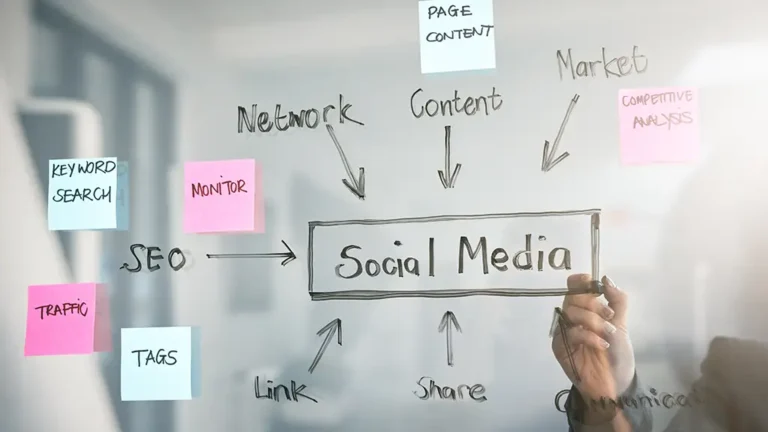The Power of Backlinks: What Businesses Need to Know About Link Building in 2025
Backlinks, also known as inbound links, are one of the most powerful factors in SEO, significantly impacting a website’s ability to rank higher in search engine results pages (SERPs). Simply put, a backlink is a hyperlink on an external website that points back to your site. These links act as “votes of confidence,” signaling to search engines that your content is valuable, trustworthy, and relevant. The more high-quality backlinks your website receives, the higher it will rank in search results, driving more organic traffic to your pages.
Link building, the process of acquiring backlinks from other websites, is essential for improving your website’s SEO performance. It helps build domain authority, which is a metric search engines use to measure the credibility of a website. When your site is linked to by authoritative and reputable sources, it sends a signal to search engines that your content is worth ranking higher. In 2025, as SEO continues to evolve, businesses must recognize the power of backlinks and implement effective link-building strategies to maintain a competitive edge. Partnering with an SEO marketing agency can help businesses create and execute a successful link-building strategy, optimizing their website for better visibility and organic growth.
How Backlinks Impact Search Engine Rankings
Backlinks are a fundamental ranking factor in search engine algorithms. Search engines like Google use backlinks to assess the authority, relevance, and trustworthiness of a website. When a website with high authority links to your site, it transfers a portion of its “link equity” to your site, increasing your chances of ranking higher in search results. This is why having backlinks from high-quality, authoritative websites is more valuable than having many low-quality backlinks.
The impact of backlinks on SEO is tied to the principle that search engines aim to provide the most relevant and trustworthy content to users. If your website is linked to by reputable sources, it demonstrates that your content is credible and authoritative in your industry. Additionally, backlinks can help search engines discover your content faster. When search engines crawl the web, they follow backlinks from one page to another, which means that backlinks help search engines index your website’s pages. Without backlinks, it would be much harder for search engines to discover new or updated content on your site.
The quantity of backlinks is important, but quality matters even more. Backlinks from high-authority websites—such as government sites, educational institutions, well-known industry leaders, or major media outlets—carry more weight than links from lesser-known or irrelevant websites. The relevance of the linking website also plays a crucial role. For example, if you run an e-commerce store selling outdoor gear, a backlink from a respected outdoor lifestyle blog will carry more value than a link from an unrelated blog about cooking. In 2025, focusing on acquiring high-quality, relevant backlinks will continue to be a critical aspect of any successful SEO strategy.
Types of Backlinks: DoFollow vs. NoFollow
Backlinks are typically classified into two categories: DoFollow and NoFollow. Understanding the difference between these two types of backlinks is essential for any business that is looking to implement an effective link-building strategy.
DoFollow links are the most common and valuable type of backlinks. When a website provides a DoFollow link to your site, search engines pass “link equity” from the linking website to your website, helping to improve your site’s authority and rankings. These links are seen as endorsements, suggesting that the content on the linked page is credible and relevant. As such, DoFollow backlinks are considered a critical factor in SEO because they directly contribute to improving search rankings.
On the other hand, NoFollow links do not pass link equity to the target website. When a website uses a NoFollow attribute for a backlink, it tells search engines not to follow that link or pass on any ranking benefit. Although NoFollow links don’t directly improve search engine rankings, they can still be valuable for generating traffic. These links can drive referral traffic and help with brand exposure, as users might still click on them, leading to visits to your website. Furthermore, NoFollow links are often used in cases where a website doesn’t want to endorse or pass authority to the linked page, such as in comments, social media links, or paid ads.
For businesses, it’s essential to focus on acquiring DoFollow backlinks from reputable sources, as these will provide the most significant SEO benefit. However, NoFollow links should not be completely disregarded. A natural backlink profile will contain a mix of both DoFollow and NoFollow links. Working with an agency can help you develop a balanced link-building strategy that incorporates both types of backlinks effectively, ensuring a healthy and diverse link profile that supports your SEO efforts over time.
The Quality of Backlinks: Focus on Relevance and Authority
When it comes to link building, the quality of backlinks is far more important than the quantity. A single high-quality backlink from an authoritative website is far more valuable than dozens of links from low-quality or irrelevant sources. The key factors that determine the quality of a backlink include the authority of the linking website, the relevance of the link to your content, and the trustworthiness of the source.
Authority refers to how credible and well-established a website is within its niche or industry. Websites with high domain authority (DA) are seen as trustworthy by search engines. These sites typically have a long-standing online presence, a high volume of high-quality content, and a robust backlink profile. For example, backlinks from government websites (.gov), educational institutions (.edu), or well-known industry leaders are highly authoritative and can significantly boost your website’s rankings. Similarly, backlinks from top-tier media outlets, respected blogs, and influential figures in your field can lend credibility to your content, improving your site’s perceived authority.
Relevance is another critical aspect of a high-quality backlink. Search engines consider the relevance of the source website to the topic at hand when determining the value of a backlink. For instance, if you run a digital marketing agency, a backlink from a reputable SEO or marketing blog would carry more weight than a link from a fashion blog. When link building, it’s important to focus on acquiring backlinks from websites that are contextually related to your business or industry. Relevant backlinks signal to search engines that your content is aligned with trusted and authoritative sources in the same field, making your content more likely to rank higher for related search queries.
Finally, trustworthiness plays a significant role in determining the value of a backlink. Websites that have established themselves as trustworthy, such as those with clean histories, secure connections (HTTPS), and positive user experiences, are more likely to pass valuable link equity to the sites they link to. On the other hand, backlinks from spammy or low-quality sites can have the opposite effect, potentially harming your SEO efforts. In 2025, Google continues to refine its algorithms to better understand the quality and trustworthiness of websites, so it’s essential to focus on building links from trusted, reputable sources.
Ethical Link Building: Avoiding Black-Hat Techniques
While link building is a highly effective SEO strategy, businesses must be cautious about the methods they use to acquire backlinks. Not all link-building tactics are created equal, and engaging in unethical or manipulative practices can lead to penalties from search engines, significantly harming your website’s rankings and visibility. These unethical practices are referred to as black-hat SEO techniques.
Link farming, paid link schemes, and content scraping are examples of black-hat techniques. Link farming involves creating a network of websites that exist solely to exchange backlinks, while paid link schemes involve buying links from low-quality or irrelevant websites. Both methods violate Google’s guidelines and can result in penalties that severely impact your SEO efforts. Content scraping, on the other hand, involves copying content from other websites and republishing it on your site, hoping to generate backlinks. This practice is not only unethical but also can lead to copyright violations and further SEO penalties.
In contrast, white-hat SEO techniques are those that comply with search engine guidelines and focus on earning backlinks through ethical, sustainable methods. White-hat link building involves creating high-quality, shareable content that naturally attracts backlinks, reaching out to relevant websites for guest posting opportunities, or leveraging partnerships with influencers and industry leaders. These approaches may take more time to yield results, but they are much more likely to result in long-lasting, positive outcomes for your website’s SEO.
Building backlinks through white-hat techniques ensures that your website’s link profile remains clean, avoiding the risks associated with black-hat practices. For businesses aiming to maintain a reputable online presence and avoid penalties, working with a trusted SEO marketing agency can help guide your link-building efforts and ensure that all backlinks are acquired ethically and sustainably.
The Role of Content in Link Building
Content is at the heart of any successful link-building strategy. Without high-quality, engaging content, it becomes much more challenging to attract backlinks naturally. Content serves as the foundation upon which businesses can build relationships, establish authority, and earn valuable links. The more valuable and shareable your content is, the more likely others will link to it.
One of the most effective ways to earn backlinks is by creating shareable content. This includes creating in-depth blog posts, case studies, research reports, whitepapers, and infographics that provide valuable insights to your target audience. Content that answers common questions, solves problems, or provides actionable advice tends to be shared more frequently, which increases the chances of other sites linking to it.
Another important type of content for link building is guest blogging. Writing guest posts for reputable websites in your industry not only positions you as an expert but also allows you to include backlinks to your website within the content. Guest posts are a great way to reach new audiences and gain backlinks from relevant and authoritative websites.
Linkable assets are also an important consideration in content strategy. These are pieces of content that are designed to attract backlinks because they offer high value. Examples include comprehensive guides, resource pages, research studies, or expert roundups. Linkable assets tend to attract links over time as others in your industry reference and share your content.
To create link-worthy content, it’s essential to focus on quality over quantity. Content that provides unique insights, answers specific queries, and is well-researched is more likely to be cited by other content creators, leading to natural backlinks. Additionally, businesses should regularly update older content to keep it fresh and relevant, ensuring that it continues to attract new links over time.
By consistently producing high-quality, valuable content, businesses can create a steady stream of backlinks that improve search engine rankings, build authority, and drive more traffic to their websites. As backlink acquisition becomes increasingly competitive, creating content that is not only informative but also shareable is a key strategy for success in 2025.
The Growing Importance of Earning Natural Links
In 2025, the focus of link building has shifted toward earning natural links through organic means. Natural link-building occurs when other websites link to your content because it’s valuable, relevant, and of high quality. Unlike artificially generated links or purchased backlinks, natural links are a result of content that is shareable and worthy of citation by other authoritative websites.
The most effective way to earn natural links is by consistently producing high-quality content that solves problems or answers questions relevant to your audience. Content that is well-researched, engaging, and actionable naturally attracts links from reputable sites. When a website with high authority shares or references your content, it boosts your site’s credibility and helps improve its search engine rankings.
Building relationships within your industry is another key factor in earning natural links. Collaborating with influencers, thought leaders, or other businesses can help create opportunities for organic backlinks. Participating in interviews, guest posts, or collaborations allows you to share valuable insights while getting linked back to by influential websites. Earning links through these methods adds credibility to your content, further solidifying your website’s authority in the eyes of both search engines and users.
Over time, as you build a robust portfolio of high-quality content and engage with key influencers in your industry, you’ll naturally increase your backlink profile. It’s essential to stay patient as this process can take time, but the long-term benefits of natural link-building are well worth the investment. By focusing on earning organic links, businesses can ensure they are following best practices and building sustainable, high-authority backlink profiles.
Link Building and Domain Authority: How They’re Connected
Domain Authority (DA) is a metric developed by Moz that measures the strength and credibility of a website. It’s based on a variety of factors, including the number and quality of backlinks pointing to the site. Backlinks play a crucial role in boosting DA because search engines use them as a signal of a website’s trustworthiness and authority.
Having backlinks from high-authority domains is one of the fastest ways to improve your website’s DA. For example, a backlink from a .edu site, a government website, or a well-known industry blog can significantly boost your site’s authority. Domain authority, in turn, influences your rankings—websites with higher DA tend to rank better on search engines.
The goal of link building is not just to acquire backlinks, but to focus on high-quality, authoritative links that increase DA and improve your site’s overall SEO performance. This is why businesses should prioritize acquiring links from websites that have high DA themselves, rather than focusing solely on the number of links they receive. High-quality backlinks improve not only rankings but also help increase the overall strength of your website.
Domain authority is important in understanding how search engines assess and rank websites, but businesses should keep in mind that it’s a cumulative metric that develops over time. As your backlink profile improves, so does your domain authority. Ensuring that you’re acquiring high-quality backlinks and maintaining a strong content strategy will increase your DA and, consequently, enhance your rankings.
Local Link Building for Local SEO
For businesses targeting a specific geographic area, local link building is a crucial aspect of SEO. Local SEO focuses on optimizing a website for location-based searches, helping businesses appear in local search results and Google Maps. Local link building involves acquiring backlinks from sources within your community or industry that have a local relevance.
One effective way to build local links is by getting listed in local directories and business listings such as Google My Business, Yelp, or Chamber of Commerce sites. These listings not only provide backlinks but also help improve local visibility, making it easier for customers to find your business. Additionally, getting involved in local events or sponsoring local causes can provide opportunities for backlinks from local news sites, blogs, or event pages.
Collaborating with local influencers or bloggers who have authority in your area can also help acquire local backlinks. When local influencers mention your business on their website or social media profiles, it can drive relevant local traffic to your site while improving local rankings. Another valuable method is to offer discounts, promotions, or giveaways to local businesses or customers in exchange for a mention and a backlink to your website.
Local link building is especially important for small businesses and those with physical storefronts or service areas. By focusing on acquiring local backlinks, businesses can improve their visibility in location-based searches, drive more targeted traffic, and increase conversions. It also helps establish the business as a trusted entity within its community.
Measuring Link Building Success and ROI
Once you’ve implemented a link-building strategy, it’s essential to track the success and return on investment (ROI) of your efforts. Measuring the impact of your link-building activities helps ensure that you’re targeting the right sources and that your strategy is driving tangible results.
The first metric to track is the number and quality of backlinks you’ve acquired. Tools like Ahrefs, Moz, and SEMrush provide valuable insights into your backlink profile, allowing you to assess the quality of the links pointing to your site. By focusing on high-authority, relevant backlinks, you can improve your rankings and domain authority over time. These tools also help identify which pages are receiving the most backlinks, enabling you to optimize your content further.
Another important metric to monitor is organic traffic. As you acquire more backlinks, you should see an increase in organic traffic. Use Google Analytics to track changes in traffic over time and compare this with your backlink acquisition efforts. Increased organic traffic from relevant sources is a clear sign that your link-building strategy is working.
Keyword rankings are another indicator of success. If your website’s rankings improve for the target keywords over time, it’s likely that your link-building efforts are contributing to this progress. You can track keyword rankings using tools like Google Search Console or SEMrush to measure improvements in your search engine visibility.
Finally, evaluating the ROI of your link-building strategy involves comparing the benefits (such as increased traffic and conversions) with the investment (time and resources) required to build links. If you’re acquiring high-quality backlinks that lead to increased traffic and better rankings, then your link-building strategy is proving to be effective. By continually refining your approach and measuring results, businesses can ensure that they are optimizing their link-building efforts for maximum SEO impact.

















